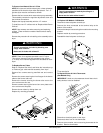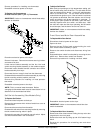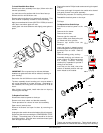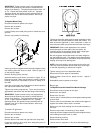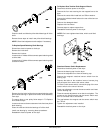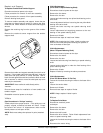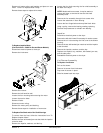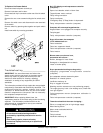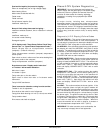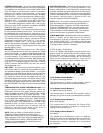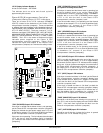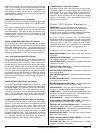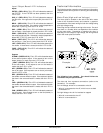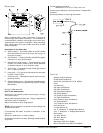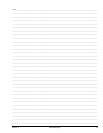
450431-3 www.amdry.com 21
Overload for impellor (fan) motor is tripping...
Either an exceptionally low or high voltage supply.
Motor bearing failure.
Motor vents are blocked with lint.
Failed motor.
Failed overload.
Out of balance impellor (fan).
Insufficient make-up air.
Burner hi-limit safety thermostat is tripping...
Insufficient exhaust ductwork, size or restriction in exhaust
system.
Insufficient make-up air.
Lint screen needs cleaning.
Damaged impellor.
L.E.D. display reads “Temp Sensor Failure Check Temp
Sensor Fuse.” or “Open Exhaust Temperature Probe.”...
Check 1/8-amp fuse on microprocessor controller
(computer). (Phase 6 units only.)
Faulty microprocessor controller (computer) temperature
sensor probe.
Open circuit or short in either one of two wires leading from
the sensor probe to the computer...
Faulty microprocessor controller (computer).
Dryer does not start. Display reads “main door”
or “lint door” with an audio indication...
Main door is open.
Lint drawer is open.
Faulty main door or lint door switch.
Open circuit in either main door or lint drawer switch
harnesses.
Faulty 24 VAC transformer.
There is excessive vibration coming from the tumbler...
Tumbler is out of adjustment.
Drive shaft or idler shaft is out of alignment.
Faulty pillow block bearing or 4-inch (10.16 cm) rear wheel.
Faulty tumbler wheel.
Drive motor and shaft not aligned.
Phase 6 OPL System Diagnostics ___
IMPORTANT: You must disconnect and lockout the
electric supply and the gas supply or the steam supply
before any covers or guards are removed from the
machine to allow access for cleaning, adjusting,
installation, or testing of any equipment per OSHA
standards.
All major circuits, including door, microprocessor
temperature sensor, heat and motor circuits are monitored.
The Phase 6 OPL microprocessor controller (computer) will
inform the user, via the L.E.D. display of certain failure codes,
along with indicators both in L.E.D. display and at the output
of each relay (and door switch circuit) to easily identify
failures.
Diagnostic (L.E.D. Display) Failure Codes
SAIL SWITCH FAIL – This routine will prevent start up on the
machine unless the sail switch is in the correct position. If
the sail switch is closed prior to start up the display will read
“SAIL SWITCH FAIL” along with an audio indication.
No AIRFLOW – If the sail switch opens during cycle operation
the display will read “No AIRFLOW” along with an audio
indication. The machine will continue to run with no heat for
3 minutes or until the temperature drops below 100º F (38º
C). Upon failure the machine will shut down and display
“No AIRFLOW” with an audio indication.
bURNER SAFETY FAIL – Routine monitors the temperature
above the burner. If the burner hi-limit switch opens the
display will read “bURNER SAFETY FAIL.” The machine will
run with no heat for 3 minutes or until the temperature drops
below 100º F (38º C). Upon failure the machine will shut
down and display “bURNER SAFETY FAIL” with an audio
indication.
dRUM SAFETY FAIL – This routine monitors the tumbler
temperature if the tumbler hi-limit switch opens prior or
during the cycle while the heat was on the machine will
display “dRUM SAFETY FAIL.” The machine will continue to
run with no heat for 3 minutes or until the temperature drops
below 100º F (38º C). Upon failure the machine will shut
down and display “dRUM SAFETY FAIL” with an audio
indication.
No HEAT – This routine monitors the burner ignition. If the
burner misignites (does not light) the ignition module will
check to see of the microprocessor program has any retries
left. The standard retry count is 2. If the module notices that
there are retries left it will purge for 1 minute then try to ignite
the burner again. The ignition module will try this for a total
of 3 times or until there are no retries left. If the burner does
not ignite after 3 attempts the L.E.D. display will display the
error code “no heat” with an audio indication. When this
occurs the machine will run with no heat for 3 minutes or
until the temperature drops below 100º F (38º C).
IMPORTANT: For other countries, such as Australia, the
retry count may not apply due to local approvals.



